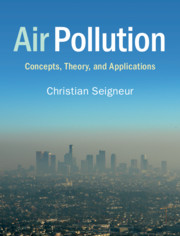Book contents
- Air Pollution
- Air Pollution
- Copyright page
- Contents
- Preface
- Main Notations
- 1 Brief History of Air Pollution
- 2 Emissions of Air Pollutants and Emission Control Technologies
- 3 Meteorology: General Circulation
- 4 Air Pollution Meteorology
- 5 Atmospheric Radiative Transfer and Visibility
- 6 Atmospheric Dispersion
- 7 The Stratospheric Ozone Layer
- 8 Gaseous Pollutants
- 9 Atmospheric Particles
- 10 Clouds and Acid Rain
- 11 Transfer of Pollutants between the Atmosphere and Surfaces
- 12 Health Effects
- 13 Environmental Impacts
- 14 Climate Change and Air Pollution
- 15 Regulations and Public Policies
- Index
- References
8 - Gaseous Pollutants
Published online by Cambridge University Press: 19 June 2019
- Air Pollution
- Air Pollution
- Copyright page
- Contents
- Preface
- Main Notations
- 1 Brief History of Air Pollution
- 2 Emissions of Air Pollutants and Emission Control Technologies
- 3 Meteorology: General Circulation
- 4 Air Pollution Meteorology
- 5 Atmospheric Radiative Transfer and Visibility
- 6 Atmospheric Dispersion
- 7 The Stratospheric Ozone Layer
- 8 Gaseous Pollutants
- 9 Atmospheric Particles
- 10 Clouds and Acid Rain
- 11 Transfer of Pollutants between the Atmosphere and Surfaces
- 12 Health Effects
- 13 Environmental Impacts
- 14 Climate Change and Air Pollution
- 15 Regulations and Public Policies
- Index
- References
Summary
Several gaseous chemical species may lead to adverse health effects and, therefore, several of those are regulated. Brief descriptions of those chemical species, including their major sources and atmospheric fate, are presented. Next, the focus of this chapter is on urban and regional pollution, since it corresponds to most of the population exposure to ambient air pollution. The gaseous pollutants that are currently the most relevant at the urban/regional scale in terms of adverse health effects are ozone and nitrogen dioxide. These pollutants are major components of photochemical smog, which results from chemical reactions between nitrogen oxides (NOx) and volatile organic compounds (VOC) in the presence of sunlight. The fact that photochemical smog precursors such as NOx and some VOC (alkenes) are both producers and destructors of ozone makes the development of efficient strategies to reduce photochemical smog difficult.
- Type
- Chapter
- Information
- Air PollutionConcepts, Theory, and Applications, pp. 146 - 189Publisher: Cambridge University PressPrint publication year: 2019

